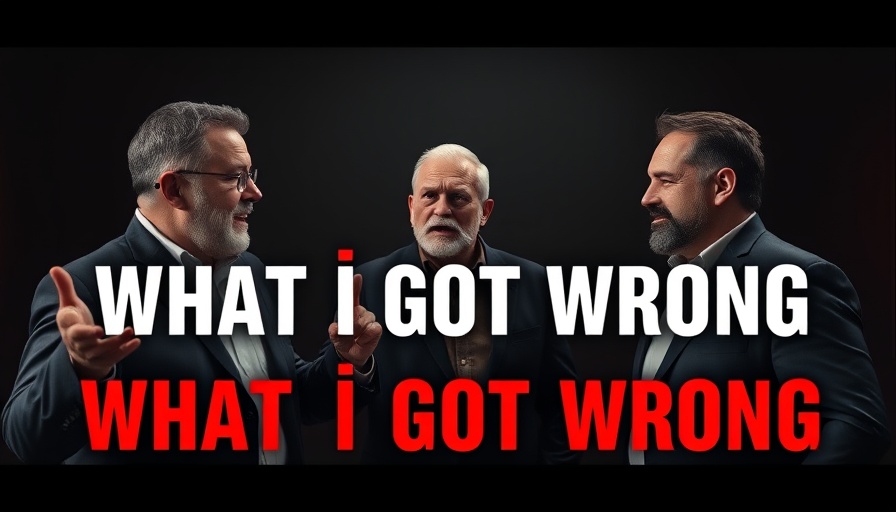
A Journey of Integrity: Rethinking Sensationalism in Discourse
The evolving landscape of YouTube has given rise to a phenomenon that celebrates sensationalism over integrity, provoking insightful discussions about the responsibility of content creators. The recent video titled I EXPOSED This Atheist – I Need to Come Clean encapsulates this journey as Steven Woodford, known as Rationality Rules, publicly acknowledges errors in his critique of historian Tom Holland’s work. This admission opens a broader conversation about the nature of discourse within the faith and skeptic communities alike.
In the video titled I EXPOSED This Atheist – I Need to Come Clean, the content creator reflects on the consequences of sensationalism in critiquing faith-related discourse, prompting deeper analysis on how we can navigate these discussions with integrity.
Challenges of Integrity and Sensationalism
When the stakes are high, the pressure to gain viewers often encourages sensationalist content that can mislead audiences. Woodford’s original video criticized Holland's work without thoroughly engaging with the material, resulting in a misattributed quote sourced from a Wikipedia entry instead of the actual book, Dominion. This misstep not only undermined the credibility of his critique but also instigated waves of reflection about the methods and motivations behind the video.
The YouTube culture frequently rewards creators for flashy titles and thumbnail designs, pushing them toward emotional exaggeration—sometimes to the detriment of genuine discourse. In Woodford's case, the issue wasn't just the Wikipedia attribution; it was the tone and the lack of academic rigor behind the criticisms, which revealed an underlying error in engaging responsibly with scholarly material.
What Woodford’s Apology Teaches Us About Critique
Woodford’s public apology is a rare act of humility. It serves as a reminder that intellectual critique should be rooted in careful scholarship and thorough research. He admitted that his critique presented an incomplete picture of Holland's arguments, primarily focusing on public appearances instead of engaging deeply with the texts themselves. Such transparency can foster a healthier discourse, encouraging others in the community to address their own missteps.
This kind of accountability is crucial, especially in an age where misinformation can spread rapidly. By openly confronting his errors, Woodford not only protects his integrity but also encourages others to approach discussions with a more thoughtful and measured mindset.
Revisiting the Role of Sensationalism in Christian Discourse
The rise of sensationalism is also mirrored in how Christian YouTubers frame their narratives, often opting for clickbait tactics to attract viewers. In reflecting on his own content, Woodford discussed the implications of using charged language, like “skewered,” which may create a visceral response, but detracts from a more reasoned discourse. This raises critical questions: Are we prioritizing attention over substance? Are nuanced conversations being drowned out by drama? These inquiries are vital for anyone serious about engaging in discussions of faith and rationality.
The Importance of Robust Critique in Theological Discussions
Critiques in theological fields often provoke deep responses, challenging worldviews and prompting discussions that can lead to greater understanding. However, as Woodford learned, critiques must be thorough and respectful, recognizing the complexity of the subject matter. Authentic critiques should engage with the work of others earnestly, providing substantial evidence rather than relying on snark or oversight.
As believers and skeptics navigate these discussions, it’s essential to cultivate an atmosphere of respect and intellectual integrity. When discussing ideas that shape faith and belief, we owe it to ourselves and others to advance the conversation beyond mere busyness to cultivate genuine understanding and respect.
Moving Forward: Building a Community of Learning
Moving forward, how can content creators and viewers alike foster environments conducive to healthy discourse? It begins with each of us taking personal responsibility for the content we consume and produce. Encouraging thoughtful dialogue, embracing openness to correction, and holding ourselves accountable can gradually shift the culture away from sensationalism to one of mutual growth.
In his reflections, Woodford hinted at potential steps forward—rebranding his channel to present a more human face to the audience, signaling a desire to build community around shared learning rather than divisiveness. This approach could serve as a catalyst for others, inviting conversations that reflect the core values of humility, understanding, and fellowship.
Call to Action: Engage with Empathy and Integrity
As we navigate the chaos of online discourse, let us collectively strive for a more measured approach to engagement. Challenge sensationalism, seek to understand diverse perspectives, and embrace correction as a means of growth. If you resonate with these ideas, comment below with your thoughts on the balance between sensationalism and integrity in faith discussions. Together, let’s cultivate a community that values truth, empathy, and meaningful dialogue.
 Add Row
Add Row  Add
Add 








Write A Comment